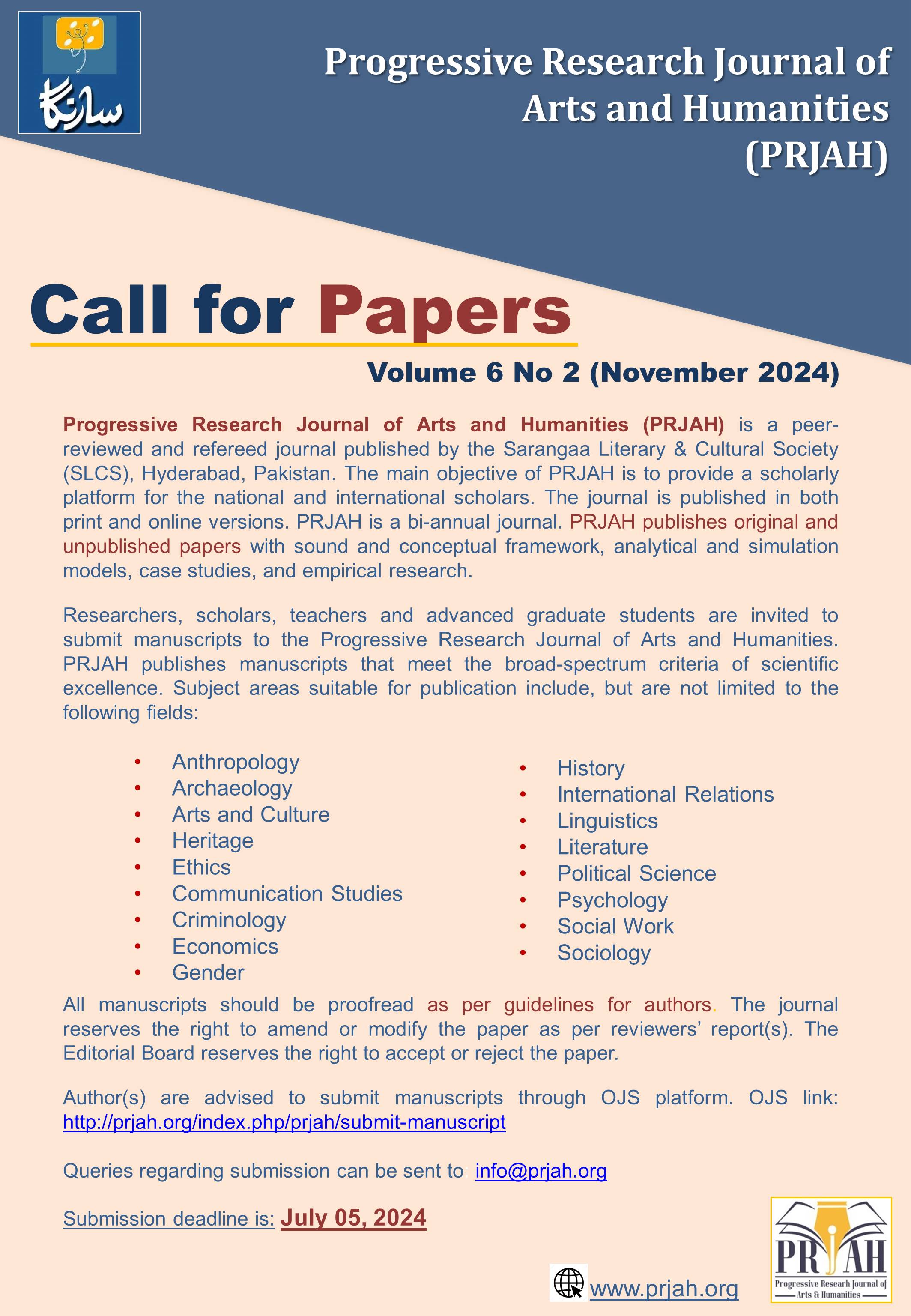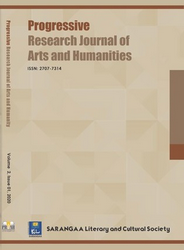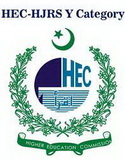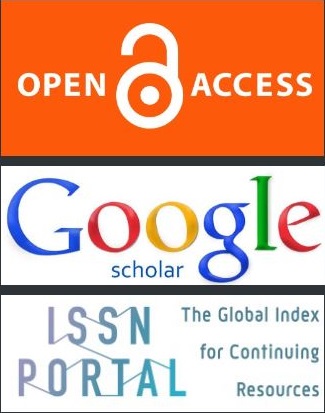Influence of Gender Discrimination on Work Performance of Female Graduates in Rural Areas of Hyderabad District
DOI:
https://doi.org/10.51872/prjah.vol6.Iss1.305Keywords:
Gender Discrimination; Less Career Opportunities; Workplace Harassment; Work Performance; Rural Areas.Abstract
This study looks at the multifaceted problems faced by the graduate females who are working in the public or private sectors in rural areas of Hyderabad District. It was a descriptive research, using the random sampling method, 150 females who were working in different public or private sectors were selected as sample. Likert scale 5.0 was used and to ensure the construct validity of the questionnaire, factor analysis technique was applied. After ensuring all the assumptions of parametric tests, regression analysis was used to see the influence of the factors of gender discrimination on work performance of graduate females. The Null Hypothesis (Ho) was not supported with the value of R=.378 R2 = .143, F=5.454, Sig=0.002). The data analysis result revealed that the job performance of female graduates is highly influenced by the socio-cultural factors which consisted of family support, gender-based discrimination and workplace harassment. The study is significant for public and private sectors for framing the policies regarding safety and security of their female employees. The study is also significant for the communities to promote gender-inclusive settings, hence promoting the empowerment and achievement of female graduates in rural areas of Hyderabad District.
References
Agboatwalla, M. (2000). Women's development in Pakistan: issues and challenges. Community Development Journal, 35(2), 181-185.
Aurat Foundation; Legal Aid Society. (2020). Deeds not Words. Pakistan Civil Society’s Alternative Report on CEDAW 2020. In Aurat Foundation (Vol. 20, Issue 8). https://www.af.org.pk/Reports/Civil Society Alternative Report on CEDAW Pakistan 2020.pdf
Akhter, N., & Akbar, R. A. (2016). Critical analysis of life of Pakistani women: Views of educated women. Journal of Elementary education, 26(1), 111-121.
Ali, T. S., Ali, S. S., Nadeem, S., Memon, Z., Soofi, S., Madhani, F., ... & Bhutta, Z. A. (2022). Perpetuation of gender discrimination in Pakistani society: results from a scoping review and qualitative study conducted in three provinces of Pakistan. BMC Women's Health, 22(1), 540.
Arshad, M., Farooq, M., Atif, M., & Farooq, O. (2021). A motivational theory perspective on entrepreneurial intentions: a gender comparative study. Gender in Management: An International Journal, 36(2), 221-240.
Nawaz, M. A., Afzal, N., & Shehzadi, K. (2013). Problems of formally employed women: A case study of Bahawalnagar, Pakistan. Asian Journal of Empirical Research, 3(10), 1291-1299.
Begum Sadaquat, M., & Sheikh, Q. T. A. A. (2011). Employment situation of women in Pakistan. International journal of social economics, 38(2), 98-113.
Brohi, A. M. (2013). Gender Differential in Social Development in Rural Sindh: A Sociological Study (Doctoral dissertation). Jamshoro: University of Sindh).
Center of Gender and Policy Studies. (2018). Rural Women in Pakistan Status Report 2018. https://asiapacific.unwomen.org/en/digital-library/publications/2018/08/status-of-ruralwomen- of-pakistan
Government of Pakistan. (2022). National Gender Policy Framework. In Ministtry of planning, development and special initaives,govrnment of Pakistan. https://www.pc.gov.pk/uploads/report/NGPF.pdf
Kothari, C. R. (2004). Research methodology: Methods and techniques. New Age International.
Connelly, R., Dong, X. Y., Jacobsen, J., & Zhao, Y. (2018). The care economy in post-reform China: feminist research on unpaid and paid work and well-being. Feminist Economics, 24(2), 1-30.
Hair, J. F., Black, W. C., Babin, B. J., & Anderson, R. E. (2014). Multivariate data analysis. Edinburgh Gate. Harlow, Essex: Pearson Education.
Ferrant, G., & Kolev, A. (2016). Does gender discrimination in social institutions matter for long term growth?: Cross-country evidence.
Ferrant, G., & Kolev, A. (2016b). Does gender discrimination in social institutions matter for long term growth: Cross-country evidence (OECD Development Centre Working Papers, Issue 330). OECD Publishing. https://econpapers.repec.org/RePEc:oec:devaaa:330-en
Iqbal, H., Afzal, S., & Inayat, M. (2012). Gender discrimination: implications for Pakistan security. IOSR Journal of Humanities and Social Science, 1(4), 16-25.
Isran, S. (2012). Status of Women in Pakistan: A Critical Analysis. Journal of Independent Studies and Research-Management, Social Sciences and Economics, 10, 85–99. https://doi.org/10.31384/jisrmsse/2012.10.2.8
Isran, S., & Isran, M. A. (2012). Low Female Labour Participation in Pakistan: Causes and Consequences. Pakistan Journal of Social Sciences, 32(2), 453–468.
Khan, G., Naveed, R. T., & Jantan, A. H. Bin. (2018). Status of Wonder Women: Challenges for Young Future Women Entrepreneurs in Pakistan. International Journal of Experiential Learning & Case Studies, 3(1), 97–109. https://doi.org/10.22555/ijelcs.v3i1.1838
Laghari, S. (2016). Honour Killing in Sindh: Men's and Women's Divergent Accounts (Doctoral dissertation, University of York).
Memon, Shah, M. (2020). Problems faced by graduate females in continuing their jobs in rural areas: a case study of hyderabad district. Biannual Research Journal Grassroots, 54(I), 153–179.
Nawaz, M. A., Afzal, N., & Shehzadi, K. (2013). Problems of formally employed women: A case study of Bahawalnagar, Pakistan. Asian Journal of Empirical Research, 3(10), 1291-1299.
Naz, S., Fazal, S., & Khan, M. I. (2017). Perceptions of women academics regarding work–life balance: A Pakistan case. Management in Education, 31(2), 88-93.
Qaisrani, A., Liaquat, S., & Khokhar, E. N. (2016). Socio-economic and Cultural Factors of Violence against Women in Pakistan A publication of the Sustainable Development Policy Institute (SDPI). Sustainable Development Policy Institute, 1–24. Retrieved from https://thinkasia.
org/bitstream/handle/11540/6823/Socio-economic%26Cultural-Factors-of-Violenceagainst- Women-in-Pakistan(W-158).pdf?sequence=1
Wang, Q., Dongchao, M., & Sørensen, B. Æ. (Eds.). (2016). Revisiting gender inequality: perspectives from the People's Republic of China. Palgrave Macmillan.
Sadaqat, M., & Sheikh, Q. (2011). Employment situation of women in Pakistan. International Journal of Social Economics, 38, 98–113. https://doi.org/10.1108/03068291111091981
Sarwar, F., & Abbasi, A. S. (2013). An in-depth analysis of women’s labor force participation in Pakistan. Middle East Journal of Scientific Research, 15(2), 208–215. https://doi.org/10.5829/idosi.mejsr.2013.15.2.2367
Tatli, A., Ozturk, M., & Woo, H. (2017). Individualization and Marketization of Responsibility for Gender Equality: The Case of Women Managers in China. Human Resource Management, 56(3), 407-430.
Voigt, K., & Spies, M. (2020). Female Education and Social Change: Changing Perceptions of Women’s Roles in Society in the High Mountains of Northern Pakistan. Mountain Research and Development, 40(4), R9–R16. https://doi.org/10.1659/MRD-JOURNAL-D-20-00028.1
World Economic Forum. (2023). Insight Report. In World Economic Forum (Issue June). https://www3.weforum.org/docs/WEF_GGGR_2023.pdf
Wang, Y., & Zhang, C. (2018). Gender Inequalities in Labor Market Outcomes of Informal Caregivers near Retirement Age in Urban China. Feminist Economics, 24(2), 147-170.
Zahidie, A., Kazi, A., Fatmi, Z., Bhatti, M. T., & Dureshahwar, S. (2011). Social environment and depression among pregnant women in rural areas of Sind, Pakistan. Journal of the Pakistan Medical Association, 61(12), 1183–1189.
Downloads
Published
How to Cite
Issue
Section
License
Copyright (c) 2024 Progressive Research Journal of Arts & Humanities (PRJAH)

This work is licensed under a Creative Commons Attribution 4.0 International License.






